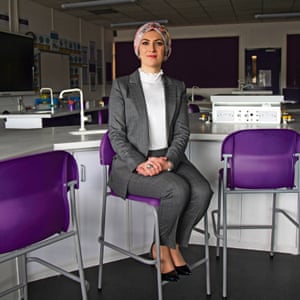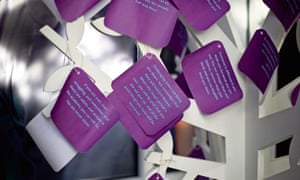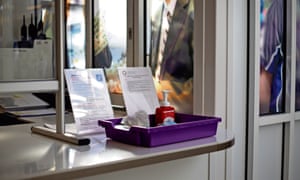
Following the news that schools and colleges will reopen, with Covid-19 testing measures in place, to all pupils – apart from those who are clinically extremely vulnerable – from 8 March, Enass Al-Ani, the principal at Small Heath leadership academy in Birmingham, felt an enormous surge of relief. “The announcement that schools will reopen fully is great news,” she says. “It’s absolutely vital that children get the whole school experience. Nothing can replace that direct face-to-face teaching. The students have missed so much: not seeing their friends; not engaging with all the things we do here, day in, day out; interactions with teachers; time in the playground; extracurricular activities. I’m so thankful and proud of the staff here for the fantastic work they’ve done, but remote teaching cannot substitute the complete experience students receive in school.”
Al-Ani, who has been principal at Small Heath leadership academy since 2017, reels off a list of school clubs that have, understandably, remained closed – from the RAF cadet programme to archery and drama club with the Birmingham Repertory Theatre. “We have very broad and wide-ranging activities taking place every single day normally,” she says. “These things just cannot be replicated online and that’s what the students have been missing out on during lockdown.” But teachers and support staff have had their work cut out, working across both online platforms and in person. “As part of Star Academies trust, we’ve worked with other Star Academies schools in Birmingham to create a hub, which remained open throughout lockdown, including bank holidays and Easter, for vulnerable students and children of key workers.”
The last year has been difficult for both staff and pupils, says Al-Ani. “Covid-19 has been a challenge for everyone and the main issue for us has been ensuring we provide students with the education they deserve.”
Thankfully, staff have been able to communicate closely with pupils over the past year. “In the first lockdown, our form tutors contacted every student in their form on a weekly basis, with pastoral leaders – our heads of year – speaking to every student weekly, too. It meant every child received two weekly calls to check on their wellbeing and progress. During this lockdown, pastoral leaders contacted students every week, too. So we know our families and students really well.

“My role as the principal – along with my senior leadership team – means ensuring we are there for staff, students and parents, that’s very important. Staff can always contact me at any time in the day or evening. Whenever they need me, I’m on email and have my phone ready.”
Al-Ani is aware of the impact lockdown has had on students’ mental health and thinks it should be prioritised. “School closures and the lockdown have taken their toll on young people’s mental health and wellbeing,” she says. “We regularly do surveys with our students, to see how we can support them better. One of the most popular responses in terms of how we can improve was: ‘Open the school [fully], we want to come back!’ They’re so excited to be back.”
It means supporting students emotionally over the coming weeks will be crucial. “We know children are incredibly resilient and bounce back, but schools have an important role to play in ensuring the pandemic doesn’t have long-term repercussions on young people’s mental wellbeing. When students return, our initial focus will be on their wellbeing and we’ll continue to provide extra support for the foreseeable future. We want children to come back and be happy about it. We want them to reintegrate into the school community and re-establish friendships. We’ll support this by focusing on providing trust and support first and, once they’ve settled in, we will ensure any gaps in learning are addressed.”
While relaxing restrictions on any sector of society will involve some risk, schools already have stringent measures in place that make it as safe as possible to fully reopen. “Well, this isn’t the first time, is it?” Al-Ani points out. “We’ve learned a great deal and have developed a comprehensive and robust reopening plan. Absolutely everything is planned for. When we [fully] reopen, we’ll continue to play our part in keeping our community safe.”

Having already purchased face coverings for staff and students well before the lockdown, strict guidelines are in place around social distancing, hand sanitising (there are stations outside every classroom) and handwashing (sinks have also been placed around the academy), with posters and videos demonstrating techniques. “We’re also very blessed at the academy as we’re able to have five different exit and entrance points,” she says. “So each year group arrives and leaves through a different entrance, which means we don’t have to stagger the start and the end of the day and bubbles won’t interact with each other.”
Regular testing forms a key part of the new safety measures, with lateral flow devices (LFD) – which turn around results in about 30 minutes – used to test potentially asymptomatic staff and pupils in schools, before they are given twice-weekly tests to carry out at home. Many staff and pupils at Small Heath leadership academy are already familiar with the testing procedure, she says. “We were lucky to be part of the pilot for the LFD tests in the autumn, so the testing is nothing new to us. It enabled us to learn and put measures in place to reassure students, parents and staff. They’re really simple and don’t hurt, so we hope the process gives everyone reassurance and that everyone takes part.”
She feels confident about the response from pupils in particular. “When we came back in September after the first lockdown, I was worried about how students and staff would react to new protective measures. But I shouldn’t have worried – they were absolutely brilliant. They accepted the new measures that had been put in place straight away, and it became part of our – I hate to say it – new normal.”
As well as taking the necessary steps to protect staff and pupils’ health, Al-Ani and the senior leadership team are focusing on boosting the school’s mood, too. “It’s been nearly a year for many students [away from school], so we’re doing a lot around their return, to uplift students’ and staff morale. We’re planning extra assemblies and rewards for students, with posters welcoming them back. And activities with staff to celebrate their contributions, as well as team-building exercises. We’re planning a fun element as part of our programme.”
How does she feel knowing that in a matter of days all pupils and teachers will finally be reunited? “I’m so excited. I’ve missed this buzz around the school, I really have. While we’ve had staff in, to have the whole cohort of staff and students in the building, that’s what I’m used to. I’m used to seeing them here and working alongside them. Hearing their voices live will just be absolutely amazing.”
To find out more information visit gov.uk/backtoschool or speak to you child’s school or college.
The schools testing plan: for parents and adults in pupils’ households and bubbles
-
Up to one in three people who have Covid-19 have no symptoms and could be spreading it without knowing. Rapid testing is a fast and easy way to find out if you have coronavirus. It’s free, voluntary and takes about 30 minutes. It’s a simple swab test to the nose and/or throat, using a rapid lateral-flow test.
-
On return, secondary school and college students will be tested twice a week, receiving three initial tests at school or college before transitioning to twice-weekly home testing, with test kits they will get from school.
-
Parents of school pupils and college students, as well as adults in their households and bubbles, will also be offered tests as part of these new regular testing measures. They will be able to access them either via their workplace if available, at a test site to collect or do on site, and if that isn’t possible there will be limited supply for them to order direct to home.
Find out how to get a free regular rapid test at gov.uk/coronavirus
Help to catch up
To address the impact Covid-19 has had on young people, the UK government has provided:
-
A new £700m education and recovery package to help young people in England catch up on lost learning.
-
An existing £1bn Covid catch-up package to tackle the impact of lost teaching time. This includes a £650m catch-up premium for state primary and secondary schools, and a £350m National Tutoring Programme for the most disadvantaged children.
-
An £8m wellbeing programme that has funded local expert support, training and resources for education staff to understand and respond to emotional and mental health pressures some children and young people may be facing.
This advertiser content was paid for by the UK government. All together (Back to school) is a government-backed initiative tasked with informing the UK about the Covid-19 pandemic. For more information visit gov.uk/backtoschool
from Lifestyle | The Guardian https://ift.tt/3kWy3YT
via IFTTT

comment 0 Comment
more_vert